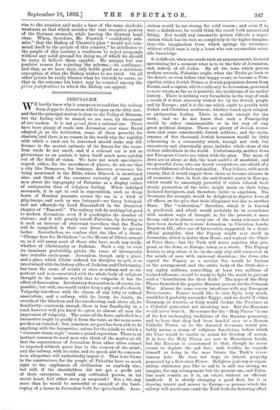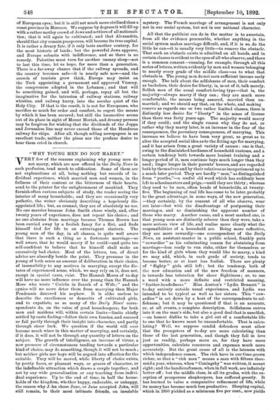JERUSALEM.
WE hardly know why it annoys us to read that the railway from Joppa to Jerusalem will be open on the 26th inst., and that the principal station is close to the Valley of Hinnom, but the feeling will be shared, we are sure, by thousands of our readers. It is not prima fade a rational one. There have been plenty of roads into Jerusalem ever since David adopted it as his habitation, some of them passable for chariots,'and there is no reason in the world why the rapidity with which a road can be traversed should make any dif- ference in the mental estimate of its fitness for the scene. Iron roads do not smell, and if a railroad car is not as picturesque as an arabah, it takes itself much more quickly out of the field of vision. We have not much speculative regard, either, for the sacredness of places; do not see that a city like Damascus, for instance, deserves reverence for being mentioned in the Bible, where Nineveh is mentioned also ; and think of the excessive curiosity of some good men about the topography of Palestine as a display rather of antiquarian than of religious feeling. When indulged overmuch, it is apt to end in superstition, such as drags hosts of Russian peasants across the sea in a kind of pilgrimage, and such as was betrayed—we fancy betrayed, and not affected—by Lord Beaconsfield in the dreamiest chapter of " Tancred." The railway will do nothing but good to modern Jerusalem, even if it quadruples the number of visitors ; and it will greatly benefit Palestine, by drawing to it such an increase of observant travellers that the Turks will be compelled, in their own direct interest, to govern better. Nevertheless, we confess that the idea of a shout : "Change here for Bethlehem " or the Mount of Olives, annoys us, as it will annoy most of those who have made any study, whether of Christianity or Judaism. Such a cry, or even its imminent probability, pricks the sense of incongruity into irritable excitement. Jerusalem, though only a place, and a place which Christ ordered his disciples to quit, is so intertwined with the history alike of Judaism and Christianity, has been the scene of events at once so solemn and so im- portant, and is so associated with the whole body of religious thought in the modern world, that to vulgarise it has the effect of desecration. Involuntary desecration is, of course, im- possible ; but still, one would rather keep a pig out of a church. Vulgarity interferes with the charm of any lofty or refined association ; and a railway, with its hurry, its bustle, its crowds of the hilarious and the unreflecting, and, above all, its familiarity—curiously enough, there is less familiarity in a road, however well you know it—gives to almost all men the impression of vulgarity. The sense of the force embodied in a locomotive ought to purify it from the taint, as the same sense purifies an ironclad ; but, somehow, no poet has been able to do anything with the locomotive, unless for the minds to which a "resonant steam eagle" seems a grand expression. There is an instinct common to most men who think of the matter at all, that the separateness of Jerusalem from other cities cannot be impaired without grave loss to the scenery of the mind ; and the railway, with its noise, and its speed, and its common- ness altogether, will undoubtedly impair it. That is no blame to the constructors, for the people of Palestine have as much right to the appliances of civilisation as anybody else; but still, if the shareholders did not get a profit out of their enterprise, would any cultivated person, in his secret heart, feel either sorry or surprised P Not a bit, any more than he would be sorrowful or amazed at the bank. ruptcy of a house in Jerusalem built for opera-bouffe. Asso-
ciation would be too strong for cold reason ; and even if he were a disbeliever, he would think the result both natural and fitting. Nor woald any reasonable person ridicule a super- stition which has its root so completely in the higher imagina- tion—the imagination from which springs the reverence, without which man is only a beast who can accumulate scien- tific knowledge.
It is difficult, when one reads such an announcement, to avoid speculating for a moment what is to be the fate of Jerusalem, and, indeed, of all Judea. By all the laws which govern modern revivals, Palestine ought, when the Turks go back to the desert, or even before that happy event, to become a Prin- cipality, with a Jewish Prince, a Jewish population drawn from Russia, and a capital, which could only be Jerusalem, governed so as to retain, so far as is possible, the traditions of its earlier history. There is nothing very formidable in the way of such a result if it were sincerely wished for by the Jewish people and by Europe ; and it is the one which ought to gratify both Judaic and Christian sentiment, whether based upon religion or antiquarian feeling. There is wealth enough for the work ; and we do not know that such a Principality would be either unmanageable or in the way of any great political designs. There are plenty of Jewish states- men, and some considerable Jewish soldiers ; and the main- tenance of five thousand Jewish horsemen would be little exhausting to a community which, though not rich, but excessively and abnormally poor, includes whole clans of the richest individuals in the world. Unfortunately, neither Jews nor European Courts are taken with the plan. The mass of Jews are as silent as fish, the least audible of mankind ; and the powerful Jews, who are heard everywhere, are afraid of a re-establishment of their nationality. They believe, with much reason, that it would impair their claim to become citizens in all countries ; that, in fact, the anti-Semitic party in Europe, which would be amazingly powerful if rulers relaxed their steady protection of the tribe, might insist on their being declared foreigners, and, therefore, liable to expulsion. The Germans, for example, would be delighted to deprive Jews of all offices, on the plea that their allegiance was due to another State. The " restoration," therefore, which it is fancied is predicted, and which would certainly be in accordance with modern ways of thought, is, for the present, a mere dream, and so is almost every one of the many schemes that have been devised to restore Jerusalem to Christian hands. Napoleon III., after one of his reveries, suggested, in a demi- official pamphlet, that the Papacy might seat itself in Jerusalem, which is holier than Rome, and replant the Chair of Peter there ; but the Turk will never sanction that pro- posal, or the Jews, or Europe, taken as a whole. The Papacy desires to stop where it is—in the only city still connected in the minds of men with universal dominion ; the Jews, who regard the Papacy as a secular foe, would be furious at the arrangement, and the entire body of the Orthodox— say eighty millions, controlling at least two millions of trained riflemen—would be ready to fight the world to prevent such a " humiliation for their faith." The keys of the Holy Places furnished the popular Russian pretext for the Crimean War. Almost the same reason interferes with any European Protectorate. France would like to own Syria very much, would for it probably surrender Egypt ; and we doubt if either Germany, or Austria, or Italy would decline the Province as a Colonial possession not involving war. But the Russians would never bear it. Reverence for the " Holy Places "is one of the few unchanging traditions of the Russian peasantry, and to hear that they had been handed over to a Roman Catholic Power, or to the detested Germans, would pro- bably arouse a storm of religious fanaticism, before which the Czar would be unable to retain his freedom of action. It is true the Holy Places are now in Mussulman hands, but the Russian is accustomed to that, though he never ceases to deplore the sad fact ; and, besides, he regards himself as being in the near future the Turk's rever- sionary heir. He does not hope to inherit property possessed by a first-class Power. Religious jealousy or super- stition, whichever you like to call it, is still too strong, we imagine, for any arrangement but the present one, and Pales- tine must remain as it is, an estate without an efficient landlord. It is slowly changing a good deal, for it is drawing nearer and nearer to Europe—a process which the railway will accelerate—and the Turk feels the fettering effect
of European eyes ; but it is still not much more civilised than a coast province in Morocco. We suppose by degrees it will fill up with a rather motley crowd of Jews and settlers of all nationali- ties; that it will again be cultivated; and that Alexandria, should that city remain prosperous, will become its true capital. It is rather a dreary fate, if it only lasts another century, for the most historic of lands ; but the powerful Jews approve, and Europe submits with indifference, and so there is no remedy. Palestine must turn for another uneasy sleep—not to last this time, let us hope, for more than a generation. There is a far-away chance that if the railway spreads, and the country becomes safe—it is nearly safe now—and the crowds of tourists grow thick, Europe may insist on the Turk appointing a permanent and approved Viceroy, the compromise adopted in the Lebanon ; and that will be something gained, and will, perhaps, repay all but the imaginative for the intrusion of railway stations, railway whistles, and railway hurry, into the secular quiet of the Holy City. If that is the result, it is not for Europeans, who sacrifice so much for order and comfort, to regret the means by which it has been secured ; but still the locomotive seems out of its place in sight of Mount Moriah, and dreamy persons may be forgiven for wishing that the dividends of the Joppa and Jerusalem line may never exceed those of the Honduras railway for ships. After all, though selling newspapers is an excellent trade, neither the pious nor the profane desire to hear them cried in church.



































 Previous page
Previous page